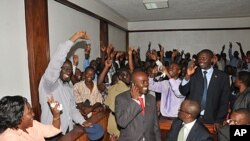Many Ugandans are critical of the police force's tactics following the death of an officer during a riot last week, and speculation is rife about the circumstances of the event and what it means for the opposition movement.
On Wednesday, Ugandan opposition leader Kizza Besigye was charged in court with unlawful assembly, following a riot last week in which a police officer was killed. The atmosphere in Kampala over the past week has been tense, as both sides blame one another for the death and the public watches warily to see what will happen next.
Besigye's opposition party, the Forum for Democratic Change (FDC), has been involved since last year in a series of protest marches against the rising cost of living. Many of these demonstrations, known as "Walk to Work" protests, have turned violent.
Since last week's riot, the government has vowed to crack down on such protests. Two days after the riot, 100 people in a shopping center in central Kampala were rounded up and arrested by police. Most have since been released.
The FDC denies any wrongdoing, arguing that it is the police themselves who should be held responsible for the death of their colleague. Sam Angoliga, a leading member of the FDC, says that had the police not been deployed to stop the demonstration, there would have been no violence.
"It is regrettable to lose a life," said Angoliga. "But the police are liable for the loss of one of their colleagues. I think the police is responsible for deploying people against people who were conducting a tour authorized by them. They miscalculated the situation."
But the government places the blame for the death squarely on the shoulders of the FDC. Police spokeswoman Judith Nabakooba told local TV that the opposition should rein in their followers in order to prevent such incidents in the future.
"It was confirmed that the deceased was killed," said Nabakooba. "So what I can tell them is that instead of denying what they did, they should come up and apologize, or restrain their supporters from committing acts of violence."
On the streets of Kampala, conspiracy theories are rife. Many people, such as this man, do not believe the coroner's report stating that the policeman was killed by a "flying, blunt object." It could also have been a stray bullet fired by the police themselves, he says.
"It could have been a rock, or it could have been maybe an accidental gunshot from one of the so many security operatives. There definitely should be a post-mortem, at least to make the situation very clear. However, I doubt government is ready to go into that."
The police round-ups and detentions remind some Ugandans, like this man in Kampala, of the brutal methods used by previous Ugandan dictators like Milton Obote and Idi Amin.
"This is like history repeating itself. [The government] is feeling that its seat of power is being threatened, so it has to be brutal, just like the previous regimes. Our history says how people used to be rounded up, people used to be shot at, people had no civil liberties, people were taken to jails. I think that's what's happening."
Few people think that the current government crackdown will succeed in silencing the FDC. According to one Kampala resident, the more police harass Besigye's followers, the stronger the opposition leader will become.
"What the government are doing to harass Besigye is not going to hurt the opposition. It's going to just give them support. Actually, I believe more people are willing to join him."
Besigye himself was briefly arrested last week, along with several other politicians. He was granted bail and released and is due to appear again before the court on April 17.
News
Ugandans Critical as Opposition Leader is Taken to Court




